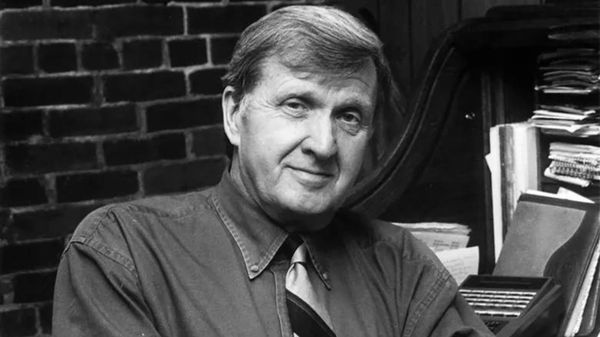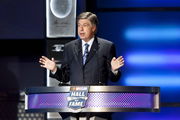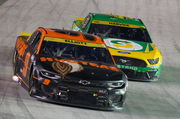

The year was 1979. The race, Daytona 500. Minutes after Richard Petty crossed the chequered flag, conquering the untameable track, the words of Ken Squier resonated through the hearts of every racing fan. “The tempers are overflowing. They’re angry, they know they have lost”, he said of the last-lap collision between Petty’s contenders Cale Yarborough and Donnie Allison. Considered to be one of the most prolific memories in racing history, Squier had just at that moment begun turning the key to the soul of NASCAR.
Over the next decades, his voice echoed in almost every living room in the country. Though he is no more with us today, the story of this star and his contributions to the sport of racing deserve to be remembered for generations to come. But where did it all begin? Pushing the rewind button on his tale takes us to a 1940s Vermont.
ADVERTISEMENT
Article continues below this ad
Ken Squier’s entry and rise in the complex world of NASCAR
Born in Waterbury, Vermont, Ken Squier was the son of the owner of a radio station. Perhaps it was listening to hours of racing broadcasts that cast him so, but a young Squier was quick to find his affinity to racing. It wasn’t long before he got hooked on the heroic descriptions of racers and began broadcasting his own channel at local short-track events. Soon, he became a voice under the gaze of NASCAR president Bill France.
Coincidentally, France happened to be knocking around the idea of a radio channel to take stock car racing to a wider reach, and Squier’s talent was particularly appealing to him. Fast forward a few years and Squier found himself as the lead announcer of the newly founded Motor Racing Network in the year 1970. But this position landed on his laps not before he had already achieved much in the world of racing. Back in 1960, he built the Thunder Road Speedway, a 0.25-mile high-banked short track, and organized his own events in it.
Getting into the partnership with the France family to form MRN, it wasn’t long before he began pitching the idea of a live telecast of Cup Series races to television broadcaster CBS. Finally getting through the barrier in 1979, his voice from the Daytona 500 penetrated through an East Coast snowstorm to the televisions of millions across America. Naming the event, “The Great American Race”, the 44-year-old announcer etched stock car racing into the minds of many that day.
Talking of the impact of his words on that fortuitous day, NASCAR icon Dale Earnhardt Jr said via his “X” handle, “Ken Squier was there when NASCAR was introduced to the rest of the world in 1979 for the Daytona 500. I’m convinced that race would have not had its lasting impact had Ken not been our lead narrator. We still ride the wave of that momentum created on that day.”
His voice, and this legendary call, forever changed our sport. pic.twitter.com/scozSNQuRt
— NASCAR (@NASCAR) November 16, 2023
From that day on, Ken Squier’s voice became the most heard and most loved in the sport for many decades that followed. His contributions to NASCAR have been such that he is still the golden standard for racing announcers today.
Watch Story: NASCAR Mourns the Loss of Ken Squire
Trending
The impact and contributions of Ken Squier to NASCAR
Above all his other roles, Ken Squier was a storyteller. In more ways than one, he had been instrumental in turning NASCAR into the well-known sport that it is today. His efforts at the deal with CBS, which led to the first live telecast of a Cup race stand as the most crucial of them. Since he called the 1979 Daytona 500, he went on to do so every year until 1997.
Some six decades after Squier called his first local race from the back of a truck as a 14-year-old, he became an unavoidable force in the highest platform of racing. One of the very few icons in NASCAR who never competed directly in races, he became an inductee of the Hall of Fame in 2018. Alongside getting his name featured in almost every Hall of Fame list there is, he was also honored with having the sport’s annual media award of excellence named after him, the “Squier-Hall Award”.
ADVERTISEMENT
Article continues below this ad
NASCAR chairman Jim France said of his impact in a recent statement, as reported by The Athletic, “Ken was a superb storyteller and his unmistakable voice is the soundtrack to many of NASCAR’s greatest moments. His calls on TV and radio brought fans closer to the sport, and for that, he was a fan favorite.” Away from the mic, Squier was a trusted spokesperson for many icons from Bill France Jr. to Bob Bahre, the founder of the New Hampshire Motor Speedway.
It’s over. Ken earned his wings last night at 8:20 PM ET, surrounded by his incredible, loving family. I grieve for the loss of my dear friend and lifelong mentor, but rejoice in the fact that his pain and struggle are over. Thanks everyone for all the prayers and good wishes. pic.twitter.com/rvohmUPaQV
— Dave Moody (@DGodfatherMoody) November 16, 2023
ADVERTISEMENT
Article continues below this ad
Seldom has a figure in racing been loved as much as Ken Squier was. The results and influence of his life’s work are summed up by the words of fellow broadcaster Mike Joy, that went, “Ken Squier trained 90 per cent of the people that are doing television and radio in racing today, either directly or indirectly.” With the legend’s demise coming at the flailing age of 88, tributes continue pouring in his name. Never have the words of a NASCAR icon strung the hearts of the racing nation in the manner that Squier’s did. Nor will they again.
ADVERTISEMENT
ADVERTISEMENT
ADVERTISEMENT
ADVERTISEMENT







